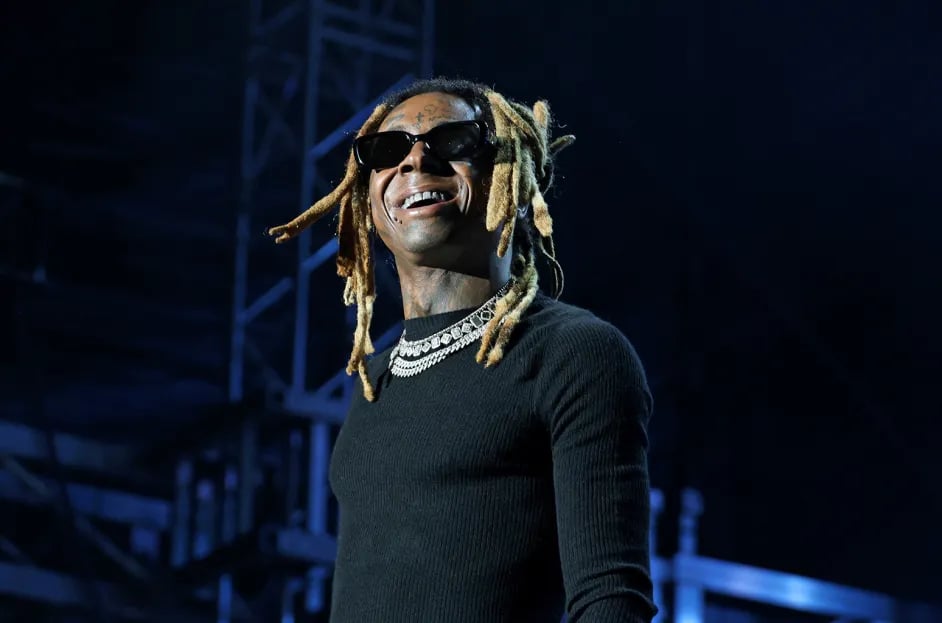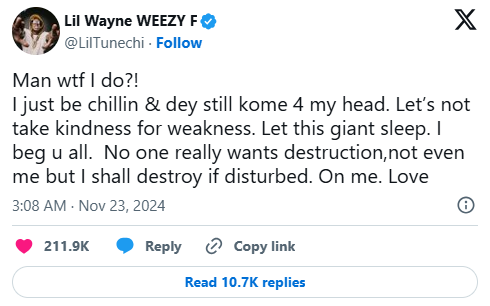Lil Wayne Responds to Kendrick Lamar’s ‘Wacced Out Murals’ Reference: 'I Shall Destroy If Disturbed'
In the ever-evolving landscape of hip-hop, where barbs and references can spark intense discussions and even rivalries, Lil Wayne recently stirred the pot with a statement that appears to directly respond to Kendrick Lamar’s mention of him in the track "Wacced Out Murals." The phrase "I shall destroy if disturbed" has ignited a flurry of speculation among fans and critics alike, prompting conversations about the implications of their lyrical exchanges.
ENTERTAINMENT NEWS


Introduction
In the ever-evolving landscape of hip-hop, rivalries and lyrical confrontations have often shaped the careers of prominent artists. One such recent development has emerged between two of the genre's most influential figures, Lil Wayne and Kendrick Lamar. The tension can be traced back to Kendrick's mention of "wacced out murals" in his lyrics, a phrase that piqued the interest of fans and critics alike. This specific reference is believed to symbolize a critique of both artistic integrity and authenticity, topics that resonate deeply within the hip-hop community.
Kendrick Lamar, known for his intricate wordplay and profound commentary on social issues, has often positioned himself as a challenger in the rap arena. His lyrics frequently address the place of established artists within the genre, and his mention of "wacced out murals" can be interpreted as a commentary on perceived trends and changes in hip-hop culture. This phrase is not just an isolated lyric; it carries weight, insinuating a certain level of discontent regarding the artistic direction of some contemporary rappers, including Lil Wayne.
On the other hand, Lil Wayne has long been recognized as a pioneering figure whose contributions have shaped modern rap. His distinct style and prolific output have established him as an icon. Therefore, Kendrick's reference posed not only an artistic challenge but also an implicit call for Wayne to respond to an underlying critique. As the industry shifts and evolves, the interactions between these two titans serve as a reflection of their respective journeys—one steeped in tradition and innovation, the other firmly rooted in contemporary relevance. As such, their recent exchange is not merely an isolated incident; it embodies a larger narrative about the state of hip-hop and its future.
Background of the Reference
Kendrick Lamar's lyrics often weave intricate metaphors that resonate with listeners on multiple levels. One such phrase that emerged in his recent work is "wacced out murals." This expression serves as a vivid metaphor, drawing parallels between the volatility in hip-hop and the often transient nature of graffiti art. Murals, which are usually bold and grand expressions of creativity, can quickly become "wacced out" — a term that suggests degradation or a loss of significance. In hip-hop, this can symbolize the fleeting attention artists receive or the rapid evolution of trends and styles within the genre.
The significance of "wacced out murals" extends beyond mere language; it taps into the art world's broader context, where street art is both celebrated and criticized. Murals can serve as powerful statements about culture and identity, yet they may also deteriorate over time, becoming obscured or forgotten. This duality is reminiscent of what many recognize in the hip-hop industry, where many artists initially burst onto the scene only to quickly fade into the background, their contributions rendered less important as new voices emerge. Such a comparison raises questions about legacy, relevance, and artistry.
Lamar's choice to use this metaphor in his lyrics also underscores the competitive nature of hip-hop. Artists like Lil Wayne and Kendrick Lamar are often engaged in a complex dialogue through their music, where references and retorts evolve swiftly. The imagery of "wacced out murals" could easily signify a challenge, hinting at the stakes involved in artistic integrity and survival within the music scene. As such, it is no surprise that Lil Wayne felt compelled to respond, viewing this lyrical challenge as a direct reflection of the competition and camaraderie inherent in hip-hop culture.
Lil Wayne's Reaction
Lil Wayne's response to Kendrick Lamar's reference in "Wacced Out Murals" has captured significant attention in the hip-hop community. The phrase "I shall destroy if disturbed" resonates deeply, carrying both literal and figurative meanings that encapsulate Wayne's artistic persona. On the surface, this declaration can be interpreted as a warning to those who provoke his creative energy. It reflects a sense of readiness to defend his legacy and impact in the industry should he feel threatened or belittled. This direct assertiveness showcases Wayne's commitment to his craft and underscores the aggressive yet introspective nature of his artistry.
Delving further into the figurative aspect, Wayne's statement may also symbolize his relentless determination to excel in a competitive environment. The phrase suggests that while he is often contemplative and reflective, he will not hesitate to unleash his full potential when challenged. This duality aligns with Wayne's established persona as a prolific artist who balances introspection with bravado. Throughout his career, he has faced numerous criticisms and comparisons with other prominent figures, such as Kendrick Lamar. His response can be seen as a robust reaffirmation of his own prowess, effectively reminding the audience of his accomplishments and influence within the genre.
Moreover, the tone behind Wayne's words conveys not just a reaction but also an invitation for discourse. By asserting his readiness to "destroy," he implies an openness to engage in artistic rivalry, an element that has historically fueled creativity in hip-hop. By embracing this competitive spirit, Wayne reflects his understanding of the genre's dynamics, recognizing that challenges can lead to innovation and growth. Overall, his response encapsulates the essence of his character, showcasing a combination of confidence, assertiveness, and an unwavering dedication to his art.
The Historical Rivalry Between Lil Wayne and Kendrick Lamar
The relationship between Lil Wayne and Kendrick Lamar is marked by a complex intertwining of admiration, competition, and mutual respect. Their dynamic began to take shape in the early 2010s when both artists were establishing their influence in the hip-hop realm. Lil Wayne, often recognized as one of the most prolific figures in the genre, held a dominant position in the industry, while Kendrick Lamar emerged as a fresh, innovative voice that would challenge conventional norms.
One significant moment in their relationship occurred during the 2013 BET Awards cypher, where Kendrick unleashed a verse that included a direct challenge to several rappers, including Lil Wayne. This declaration put Kendrick on the map as a contender, provoking a wave of speculation regarding a potential rivalry. The following interactions included subliminal shots and references in their respective tracks, with each artist maintaining a level of ambiguity that added to the intrigue surrounding their competitive spirit.
Despite the competitive undertones, there have been instances of collaboration and deep-seated respect. Lil Wayne appeared to endorse Kendrick's talent in various interviews, acknowledging him as a force that represents the future of hip-hop. Their collaborations, although limited, showcase an underlying recognition of each other's artistic capabilities. Kendrick's song "The Heart Part 4" features a reference aimed at Lil Wayne, suggesting that their rapport is not only part rivalry but also a channel for inspiration that drives each artist to shine brighter.
As the two artists continue to evolve, their rivalry maintains a significant place within the hip-hop landscape. The complex interplay of respect, competition, and artistic growth between Lil Wayne and Kendrick Lamar will likely keep their names intertwined in discussions of the genre's hierarchical structure. Their mutual influence on each other's work speaks to the broader narrative of hip-hop's interconnectivity and the enduring dynamics between its leading figures.
Fan Reactions and Social Media Buzz
In the wake of Lil Wayne's pointed response to Kendrick Lamar's reference in "Wacced Out Murals," the hip-hop community has erupted with a mix of reactions across various social media platforms. Fans have taken to Twitter, Instagram, and hip-hop forums to express their opinions on the exchange, resulting in a vibrant discussion that showcases both admiration and criticism for the two artists. The longstanding rivalry between Wayne and Lamar has reignited, leading to a slew of tweets and posts debating the implications of Wayne's assertive declaration, "I shall destroy if disturbed."
On Twitter, numerous fans expressed their delight at Wayne's rebuttal, with many highlighting the back-and-forth nature of their lyrical exchanges as a testament to the competitive spirit prevalent in hip-hop. Enthusiastic supporters have hailed Wayne's resilience and confidence, often utilizing hashtags such as #LilWayneVsKendrick to join the conversation. In contrast, some users voiced skepticism about the necessity of the response, arguing that it might exacerbate tensions rather than foster healthy competition.
Instagram also witnessed an influx of memes and reactions, with fans sharing snippets of the artists' previous works and drawing comparisons between their styles. Hip-hop influencers and commentators contributed to the dialogue, analyzing the potential impacts of the exchange on each artist's reputation and future collaborations. Some have pointed out that while Wayne’s assertive language appeals to long-time fans, Kendrick’s artistry brings a more introspective approach to hip-hop, driving the discussion even further.
Across various hip-hop forums, users delved deeper into the artistic merits of both rappers, examining their discographies and lyrical prowess. As the situation unfolds, it is evident that Lil Wayne's response to Kendrick Lamar has not only sparked an energetic dialogue among fans but has also reinforced the enduring legacy and competitive nature of the hip-hop genre, encouraging others to share their perspectives. This exchange serves as a reminder of the passion that surrounds these influential figures and the dynamic culture of hip-hop.
Impact on Hip-Hop Culture
The ongoing dialogue between Lil Wayne and Kendrick Lamar represents a significant moment in hip-hop culture, highlighting the enduring importance of lyrical confrontations within the genre. Such exchanges have historically served not only as a source of entertainment but also as a means of asserting artistic identity and authenticity. Hip-hop thrives on competitiveness, and rivalries fuel the creative fire, pushing artists to elevate their craft and engage more deeply with their audience.
This recent back-and-forth can be viewed as a continuation of a long-standing tradition in hip-hop, where artists use their lyrical prowess to challenge one another. From the early days of diss tracks to contemporary exchanges on social media, each instance shapes the narrative of the genre. The competitiveness inherent to hip-hop allows for a unique form of storytelling, as artists delve into their personal experiences, aspirations, and frustrations. In this light, Lil Wayne’s response to Kendrick Lamar can be seen as an assertion of his position and relevance within the industry, reinforcing that each artist contributes to the broader tapestry of hip-hop culture.
The involvement of both artists in this dialogue also speaks to the evolution of rivalry in hip-hop. Today's artists not only reference each other directly, but they also engage in a dialogue about influence, legacy, and style. Such interactions prompt fans to reflect on the lyrical authenticity of the artists they admire, resulting in a more nuanced understanding of what it means to be a rapper in today’s landscape. Ultimately, these exchanges serve as a testament to the dynamic nature of hip-hop, where the interplay between respect and rivalry continues to shape both careers and the cultural narrative at large.
Conclusion
In navigating the evolving dynamics of hip-hop, the exchange between Lil Wayne and Kendrick Lamar regarding the reference to "Wacced Out Murals" has stirred considerable conversation among fans and critics alike. Both artists possess a legacy marked by significant contributions to the genre, making their rivalry a focal point for discussions on artistic authenticity and competitiveness in hip-hop culture. Lil Wayne's assertive reply, stating, "I shall destroy if disturbed," reflects the ongoing tension in the industry, serving as a reminder that even seasoned artists remain sensitive to the perceptions of their peers.
This interaction highlights the intricate tapestry of the hip-hop landscape, where lyrical prowess is continuously challenged and showcased. It raises intriguing questions about the future of their rivalry and the broader implications for their respective careers. Will this confrontation lead to a series of diss tracks, or will both artists engage in a more nuanced dialogue through their music? As the genre evolves, the responses to such exchanges can significantly impact an artist's career trajectory and their place in hip-hop history.
Moreover, this situation prompts consideration of how rivalries in hip-hop contribute to the narrative of artistic growth. They can encourage artists to push their creative boundaries, thus enriching the overall fabric of the genre. How do these moments of conflict inform the careers of emerging artists who look up to legends like Lil Wayne and Kendrick Lamar? The answers to these questions may shape the discussions in the hip-hop community moving forward. Fans and listeners are encouraged to reflect on this exchange and consider the implications it has for both the artists involved and the genre as a whole.
Lil Wayne performs at 2024 Roots Picnic at Fairmount Park on June 1, 2024 in Philadelphia, Pennsylvania.Kayla Oaddams/Getty Images


Ms. Tee Tells All About Coming Up With Cash Money Records
